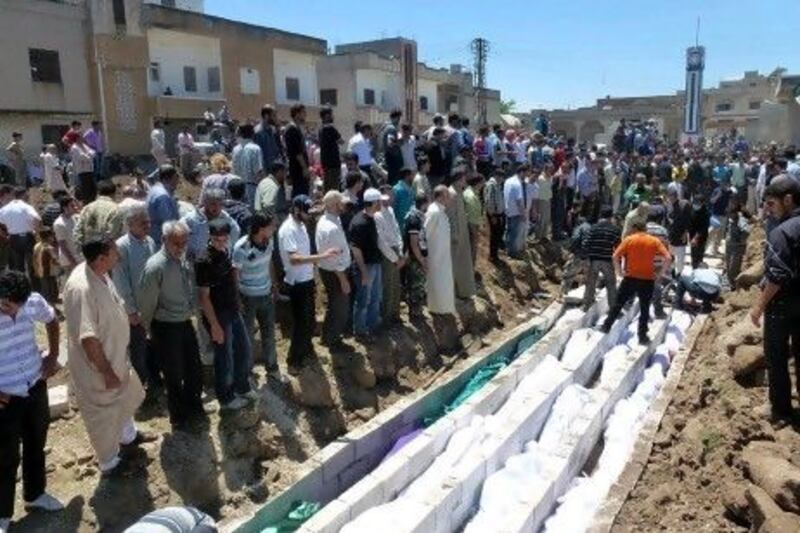DAMASCUS // UN special envoy Kofi Annan will meet the Syrian president, Bashar Al Assad, in Damascus today in an attempt to salvage a peace plan that has failed to halt spiralling violence.
Mr Annan yesterday said the deal he personally devised has still not been implemented, more than six weeks after the Syrian government agreed to it. Rebel fighters had also promised to abide by the call to stop all acts of violence.
More than 1,000 people have been killed since the April 12 ceasefire formally went into effect, according to rights groups. But iit is Friday's massacre in Hula, one of the worst single atrocities since the uprising began in March 2011, that has brought the plan's failure into sharp focus.
UN observers, in Syria to monitor compliance with the peace deal, said 108 people, among them 32 children under the age of 10, were killed in the Hula attack.
Heavy artillery and tank shells had been fired into the residential district, the UN teams found. Many of the victims had been shot in the head at close range or had their throats cut.
Only the Syrian government has heavy artillery, although it denied using such weapons and, instead, blamed "terrorists" for the slaughter.
Activists and residents of Hula say the deaths were caused by an extended artillery barrage, followed by executions carried out by a notorious pro-regime militia, known as shabbiheh, that entered the rebel-held zone seeking revenge after persistent anti-Al Assad demonstrations there.
Speaking to reporters after his arrival in Damascus yesterday, Mr Annan, a former UN secretary general, said he expected to have "serious and frank discussions" with Mr Al Assad.
Under the peace accord, the Syrian government is required to stop using heavy weapons, to withdraw troops from civilian areas and to free thousands of political prisoners. A recent UN report said only "small progress" had been made, with artillery fire, mass arrests and shootings continuing.
"I urge the [Syrian] government to take bold steps to signal that it is serious in its intention to resolve this crisis peacefully, and for everyone involved to help create the right context for a credible political process," Mr Annan said.
The UN has also said armed rebel factions have not been sticking to the ceasefire.
"And this message of peace is not only for the government, but for everyone with a gun," Mr Annan said.
The odds appear stacked against the special envoy making any significant breakthrough, however, with no indication there is any ground for political reconciliation between the regime and its opponents.
Syrian authorities are adamant they are fighting foreign-backed terrorists with whom compromise is not possible and that security services must use force to meet the threat.
Opposition groups say the Syrian people have been left no choice but to take up weapons in self-defence, with months of peaceful demonstrations asking for greater freedoms met by a hail of bullets, gruesome torture and mass arrests by security forces rather than genuine political reforms.
Underlining the difficulties in trying to broker peace across such a divide, Mr Annan arrived in Syria on a day when at least 36 people were killed nationwide, among them 21 soldiers, according to rights monitors.
The previous day more than 50 people were killed, including some in an artillery attack on the city of Hama, activists said.





